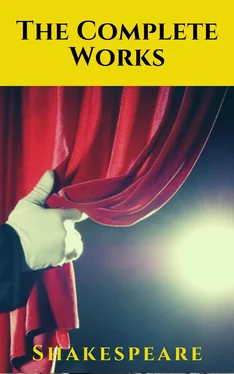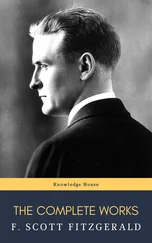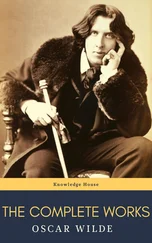Ros. It may well be call’d Jove’s tree, when it drops [such] fruit.
Cel. Give me audience, good madam.
Ros. Proceed.
Cel. There lay he, stretch’d along, like a wounded knight.
Ros. Though it be pity to see such a sight, it well becomes the ground.
Cel. Cry “holla” to [thy] tongue, I prithee; it curvets unseasonably. He was furnish’d like a hunter.
Ros. O ominous! he comes to kill my heart.
Cel. I would sing my song without a burthen; thou bring’st me out of tune.
Ros. Do you not know I am a woman? when I think, I must speak. Sweet, say on.
Enter Orlando and Jaques.
Cel. You bring me out. Soft, comes he not here?
Ros. ’Tis he. Slink by, and note him.
Jaq. I thank you for your company, but, good faith, I had as lief have been myself alone.
Orl. And so had I; but yet for fashion sake I thank you too for your society.
Jaq. God buy you, let’s meet as little as we can.
Orl. I do desire we may be better strangers.
Jaq. I pray you mar no more trees with writing love- songs in their barks.
Orl. I pray you mar no moe of my verses with reading them ill-favoredly.
Jaq. Rosalind is your love’s name?
Orl. Yes, just.
Jaq. I do not like her name.
Orl. There was no thought of pleasing you when she was christen’d.
Jaq. What stature is she of?
Orl. Just as high as my heart.
Jaq. You are full of pretty answers; have you not been acquainted with goldsmiths’ wives, and conn’d them out of rings?
Orl. Not so; but I answer you right painted cloth, from whence you have studied your questions.
Jaq. You have a nimble wit; I think ’twas made of Atalanta’s heels. Will you sit down with me? and we two will rail against our mistress the world, and all our misery.
Orl. I will chide no breather in the world but myself, against whom I know most faults.
Jaq. The worst fault you have is to be in love.
Orl. ’Tis a fault I will not change for your best virtue. I am weary of you.
Jaq. By my troth, I was seeking for a fool when I found you.
Orl. He is drown’d in the brook; look but in, and you shall see him.
Jaq. There I shall see mine own figure.
Orl. Which I take to be either a fool or a cipher.
Jaq. I’ll tarry no longer with you. Farewell, good Signior Love.
Orl. I am glad of your departure. Adieu, good Monsieur Melancholy.
[Exit Jaques.]
Ros. [Aside to Celia.] I will speak to him like a saucy lackey, and under that habit play the knave with him.—Do you hear, forester?
Orl. Very well. What would you?
Ros. I pray you, what is’t a’ clock?
Orl. You should ask me what time o’ day; there’s no clock in the forest.
Ros. Then there is no true lover in the forest, else sighing every minute and groaning every hour would detect the lazy foot of Time as well as a clock.
Orl. And why not the swift foot of Time? Had not that been as proper?
Ros. By no means, sir. Time travels in divers paces with divers persons. I’ll tell you who Time ambles withal, who Time trots withal, who Time gallops withal, and who he stands still withal.
Orl. I prithee, who doth he trot withal?
Ros. Marry, he trots hard with a young maid between the contract of her marriage and the day it is solemniz’d. If the interim be but a se’nnight, Time’s pace is so hard that it seems the length of seven year.
Orl. Who ambles Time withal?
Ros. With a priest that lacks Latin, and a rich man that hath not the gout; for the one sleeps easily because he cannot study, and the other lives merrily because he feels no pain; the one lacking the burthen of lean and wasteful learning, the other knowing no burthen of heavy tedious penury. These Time ambles withal.
Orl. Who doth he gallop withal?
Ros. With a thief to the gallows; for though he go as softly as foot can fall, he thinks himself too soon there.
Orl. Who stays it still withal?
Ros. With lawyers in the vacation; for they sleep between term and term, and then they perceive not how Time moves.
Orl. Where dwell you, pretty youth?
Ros. With this shepherdess, my sister; here in the skirts of the forest, like fringe upon a petticoat.
Orl. Are you native of this place?
Ros. As the cony that you see dwell where she is kindled.
Orl. Your accent is something finer than you could purchase in so remov’d a dwelling.
Ros. I have been told so of many; but indeed an old religious uncle of mine taught me to speak, who was in his youth an inland man, one that knew courtship too well, for there he fell in love. I have heard him read many lectures against it, and I thank God I am not a woman, to be touch’d with so many giddy offenses as he hath generally tax’d their whole sex withal.
Orl. Can you remember any of the principal evils that he laid to the charge of women?
Ros. There were none principal, they were all like one another as halfpence are, every one fault seeming monstrous till his fellow-fault came to match it.
Orl. I prithee recount some of them.
Ros. No; I will not cast away my physic but on those that are sick. There is a man haunts the forest, that abuses our young plants with carving ‘Rosalind’ on their barks; hangs odes upon hawthorns, and elegies on brambles; all, forsooth, [deifying] the name of Rosalind. If I could meet that fancy-monger, I would give him some good counsel, for he seems to have the quotidian of love upon him.
Orl. I am he that is so love-shak’d, I pray you tell me your remedy.
Ros. There is none of my uncle’s marks upon you. He taught me how to know a man in love; in which cage of rushes I am sure you [are] not prisoner.
Orl. What were his marks?
Ros. A lean cheek, which you have not; a blue eye and sunken, which you have not; an unquestionable spirit, which you have not; a beard neglected, which you have not (but I pardon you for that, for simply your having in beard is a younger brother’s revenue); then your hose should be ungarter’d, your bonnet unbanded, your sleeve unbutton’d, your shoe untied, and every thing about you demonstrating a careless desolation. But you are no such man; you are rather point-device in your accoustrements, as loving yourself, than seeming the lover of any other.
Orl. Fair youth, I would I could make thee believe I love.
Ros. Me believe it? You may as soon make her that you love believe it, which I warrant she is apter to do than to confess she does. That is one of the points in the which women still give the lie to their consciences. But in good sooth, are you he that hangs the verses on the trees, wherein Rosalind is so admir’d?
Orl. I swear to thee, youth, by the white hand of Rosalind, I am that he, that unfortunate he.
Ros. But are you so much in love as your rhymes speak?
Orl. Neither rhyme nor reason can express how much.
Ros. Love is merely a madness, and I tell you, deserves as well a dark house and a whip as madmen do; and the reason why they are not so punish’d and cur’d is, that the lunacy is so ordinary that the whippers are in love too. Yet I profess curing it by counsel.
Orl. Did you ever cure any so?
Читать дальше












